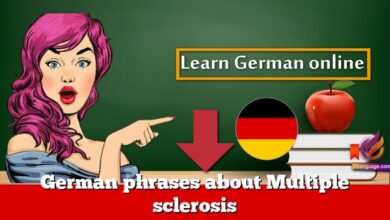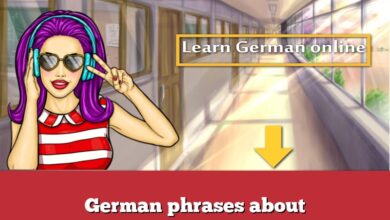Adjective Endings in German
Helpful Tips to Remember Correct German Adjective Endings

Adjective Endings in German. Adjectives are often used in day-to-day conversations. Knowing the correct adjective ending is important for your overall language fluency.
Adjective Endings in German
An adjective is a word that describes the noun. It gives a more specific meaning to the sentence. In English, there are no adjective endings. The position of the adjective (before or after noun) is not crucial. Preceding articles and pronouns do not matter either. The adjective remains the same in all cases.
For example, Our neighbor is kind or my kind neighbor or the kind neighbor. Here, the adjective “kind” is the same in all cases. It doesn’t take any endings.
Using adjectives in a sentence is not that easy in German. If a noun does not follow the adjective, that means we use a predicate adjective, then it takes no ending. For instance, Meine Freundin ist klug. (My friend is smart.)
However, the adjectives take endings if used before a noun. As you all know, German case system is an integral part of the language. Just like articles and pronouns, German adjective endings too change depending on the gender, case and number of the noun.
Another important factor that affects the German adjective endings is the type of article (definite or indefinite) and whether an article is used or not. Now, let’s learn about all these factors in detail.
Learn German Adjective Endings
German Adjective Endings without Article
When there is no article before the adjective, the endings are as follows:-
| Mask. | Fem. | Neut. | Plural | |
| Nominativ | -er | -e | -es | -e |
| Akkusativ | -en | -e | -es | -e |
| Dativ | -em | -er | -em | -en |
| Genitiv | -en | -er | -en | -er |
The above adjective endings are also applicable when an indefinite article (ein) or possessive article without an ending (mein, dein etc.) precedes the adjective.
- Ich mag bunte Vorhänge. (I like colorful curtains.)
- Wo ist dein altes Haus? (Where is your old house?)
- Ein kalter Kaffee ist immer erfrischend. (A cold coffee is always refreshing.)
Tip 1 – Adjective endings without article (nominative, accusative and dative case) are similar to definite articles (der, die, das) without the letter “d”. The definite articles in accusative case are den, die, das and die. The adjective endings are (d)–en, (di)–e, (d)–es and (di)–e. For neuter, the ending is “–es” instead of “-as”.
German Adjective Endings with Article
When a definite article (der, die, das etc.) precedes the adjective, the endings are as follows:-
| Mask. | Fem. | Neut. | Plural | |
| Nominativ | -e | -e | -e | -en |
| Akkusativ | -en | -e | -e | -en |
| Dativ | -en | -en | -en | -en |
| Genitiv | -en | -en | -en | -en |
The above adjective endings are also applicable when an indefinite article (einen, einem etc.) or possessive article with an ending (meiner, deinem etc.) precedes the adjective.
- Der blaue Bleistift ist verloren. (The blue pencil is lost.)
- Ich wohne in einem großen Haus. (I live in a big house.)
- Die Schuhe liegen unter meinem neuen Bett. (The shoes are under my new bed.)
Tip 2 – Adjective endings with article in dative and genitive case are always the same (–en), irrespective of gender and number. The adjective endings for plural nouns are also the same (–en) in all the 4 cases.
Tip 3 – Adjective endings with article in nominative and accusative case (singular nouns) are always “–e“ irrespective of gender. The only exception is accusative masculine form. It takes the ending “–en“.
You will always get the adjective endings right, if you remember these three useful tips.
Now that you know how and when to use the German adjective endings, let’s go through some simple adjectives in German.
List of Common German Adjectives
Learning new adjectives with their opposites is a great way to improve your German vocabulary. We have complied a list commonly used adjectives for you.
Make sure that you listen to the audio at the end of this table. Repeat the words after the speaker to improve your pronunciation.
| Antonyms | Gegenteile |
| happy – sad | glücklich – traurig |
| rich – poor | reich – arm |
| young – old | jung – alt |
| hot – cold | heiß – kalt |
| big – small | groß – klein |
| long – short | lang – kurz |
| high – low | hoch – niedrig |
| strong – weak | stark – schwach |
| fat – thin | dick – dünn |
| wide – narrow | breit – eng / schmal |
| deep – shallow | tief – flach |
| bright – dark | hell – dunkel |
| fast – slow | schnell – langsam |
| good – bad | gut – schlecht |
| clean – dirty | sauber – schmutzig |
| beautiful – ugly | schön / hübsch – hässlich |
| interesting – boring | interessant – langweilig |
| expensive – cheap | teuer – billig |
| easy – difficult | einfach – schwierig |
| early – late | früh – spät |
| quiet – loud | ruhig / still – laut |
| active – lazy | aktiv – faul |
| intelligent – dumb | intelligent – dumm |
| healthy – unhealthy | gesund – ungesund |
| comfortable – uncomfortable | bequem – unbequem |





























